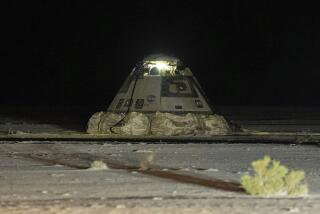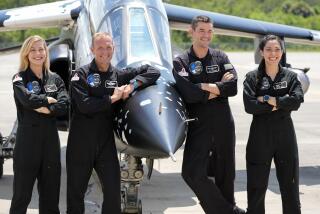Weather Delays Launch of Atlantis, Jupiter Probe
- Share via
KENNEDY SPACE CENTER, Fla. — After winning in the courts and jailing a few protesters, NASA lost the chance to launch the shuttle Atlantis today when a few storm clouds moved over the Kennedy Space Center.
The space agency plans to try again Wednesday when a 29-minute launch window opens at 9:50 a.m., but the weather was not expected to be much better.
The delay was another frustrating setback for scientists at the Jet Propulsion Laboratory in Pasadena who have worked for 12 years to get the Galileo spacecraft, now nestled in the Atlantis’ cargo bay, launched to Jupiter on a mission that is several years behind schedule.
If Galileo is not on its way by Nov. 21, it will have to be put back on the shelf--where it has been several times before--for another two years because it will be that long before the planets will be aligned so that the spacecraft can get to Jupiter.
Air Force weather officials said there is a 40% chance that the weather will permit the launch Wednesday, and Thursday’s weather is expected to be at least twice that bad.
Because of tighter weather restrictions in the post-Challenger era, it does not take much to scrub a launch, and midday launches are particularly difficult because of storms that tend to drift across the coast during the middle of the day. Atlantis had been scheduled for a 12:57 p.m. EDT launch.
Galileo will use about 48 pounds of plutonium 238 to produce electricity to run its many experiments, and anti-nuclear protesters have tried repeatedly to block the launch. After failing in a court challenge, eight people quietly walked across the boundary at the spaceport Monday and were arrested.
A ninth person was arrested for trespassing this morning, but security officials said that person was not part of the protest group.
Opponents of the Galileo mission, who had vowed earlier to sit on the launch pad and block the launch, did not try to gain access to the pad today. Instead, they issued a plea for persons to remain at least 25 miles from the spaceport.
More to Read
Sign up for Essential California
The most important California stories and recommendations in your inbox every morning.
You may occasionally receive promotional content from the Los Angeles Times.













